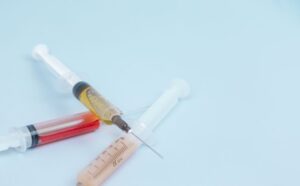What Is the Best Way of Disposing Medical Waste?
 Medical waste is waste produced in hospitals and healthcare facilities. It is any waste that is generated during doctor’s surgeries, dental procedures, and in laboratories. This waste can be dangerous to the environment as well as humans if not disposed of correctly. Therefore, strict rules apply from its production to its movement, management, and recovery or disposal.
Medical waste is waste produced in hospitals and healthcare facilities. It is any waste that is generated during doctor’s surgeries, dental procedures, and in laboratories. This waste can be dangerous to the environment as well as humans if not disposed of correctly. Therefore, strict rules apply from its production to its movement, management, and recovery or disposal.
The healthcare sector must ensure that they are disposing of pharmaceutical waste correctly to prevent harm to others. If you’re looking for professional restoration and cleanup services for medical waste in Brevard County, 911 Restoration will help you clean up medical waste and dispose of it off properly.
Types of Medical Waste in the US
There are many different types of medical waste, categorized largely by the types of materials used and the waste disposal methods. In the US, medical waste is divided into four categories, making disposing of it easier. Different types of medical wastes require different disposal techniques. The hospital staff and patients need to sort out the medical waste into different categories before disposal. This process reduces the risk of contamination, meaning the materials could not spread to other areas. Solid medical waste is divided into the following categories:
- General Waste- is the least harmful waste generated at healthcare facilities and resembles household or office waste. About 85% of the waste generated in hospitals is general waste, including items like paper, plastics, liquids, and other materials that do not fit into the three categories below. This waste is disposed of regularly like other wastes, and professionals refer to this as municipal solid waste. It is disposed of in landfills.
- Infectious Waste – as the name suggests, this type of waste generated in hospitals or other facilities can cause harm to humans by infecting them. Infectious waste may contain traces of blood, human tissue, or anything contaminated with bodily fluids. Such waste products include human tissue (blood or other body parts), blood-soaked bandages, discarded surgical gloves, cultures, stocks, injections, razor blades, and swabs to inject cultures. Disposing of infectious waste requires specific techniques and treatment methods. This type of waste is also called biomedical waste, and it needs to be taken care of promptly as it is dangerous to humans exposed to it.
- Hazardous Waste – This category includes waste that is dangerous and can cause injuries. Products like sharp objects, discarded surgical equipment, glassware, test tubes, and some chemical waste, including medical and industrial waste. If hazardous waste like blades or syringes has been exposed to human or animal tissue before discard, this hazardous waste is also infectious. Old drugs, including chemotherapy agents, are sometimes hazardous. Around 20% of the waste generated in the healthcare sector was considered hazardous material.
- Radioactive Waste – Some treatment procedures and medical equipment at the hospital include radioactive substances and isotopes. For example, radioactive medicinal treatment and cancer therapies like chemotherapy involve radioactive substances. Pathological waste contaminated with radioactive material is usually treated as radioactive waste rather than infectious waste at hospitals. Hospitals that specialize in cancer treatments generate radioactive waste more commonly. They hire professionals to dispose of such waste before it harms humans and the environment.
All this waste generated is not disposed of properly. It was found that over 16 000 million injections are administered worldwide, but not all of these are discarded properly. Some are thrown in landfills without treating them first. Different types of medical wastes are treated differently. 911 Restoration can help you destroy any waste from types 1 to 4. Here are a few ways to treat medical waste effectively to make it safer for humans and the environment.
Autoclaving
The process involves steam sterilization. Autoclaving technique uses very hot steam for a determined amount of time on the waste that is contaminated. This procedure works best for infectious waste. At the end of the process, infections and microorganisms on the instrument have been destroyed. This disposal technique is effective because it costs much less than other methods. It may not work for all kinds of biomedical waste, but 90% of the time, professional cleaning-up companies use this method to disinfect medical instruments before throwing them off into landfills.
Incineration
This procedure is far more expensive than autoclaving and can also cause health risks. It involves the burning of hazardous medical waste, including infectious waste. However, the emissions produced can be harmful, so it is important to ensure a reputable company does it. They can review the materials and see if they are safe for burning. This method is quick and simple, so many companies go for it as their first choice.
Chemicals
Chlorine and other disinfecting chemicals can be used when it comes to disposing of liquid waste. It kills pathogens in liquid waste and once treated, people can drain it into the sewer system.
Microwaving
Waste is shredded, mixed with water, and then internally heated to kill microorganisms and other harmful elements during this process. It is one of the most effective techniques used by companies to dispose of medical waste. It lowers the volume of waste and is more energy-efficient than incineration.
Which One Is the Best?
Many companies use autoclaving as it is the most economical and safe choice for medical waste disposal. Waste disposal is particularly essential for medical supplies because some waste can be contaminated with diseases or dangerous pathogens. Restoration Companies for medical waste like 911 Restoration have the knowledge and skills to dispose of such waste. If you’re looking for the perfect waste removal company to collect your biomedical waste, contact us today at (321) 399-5934.


